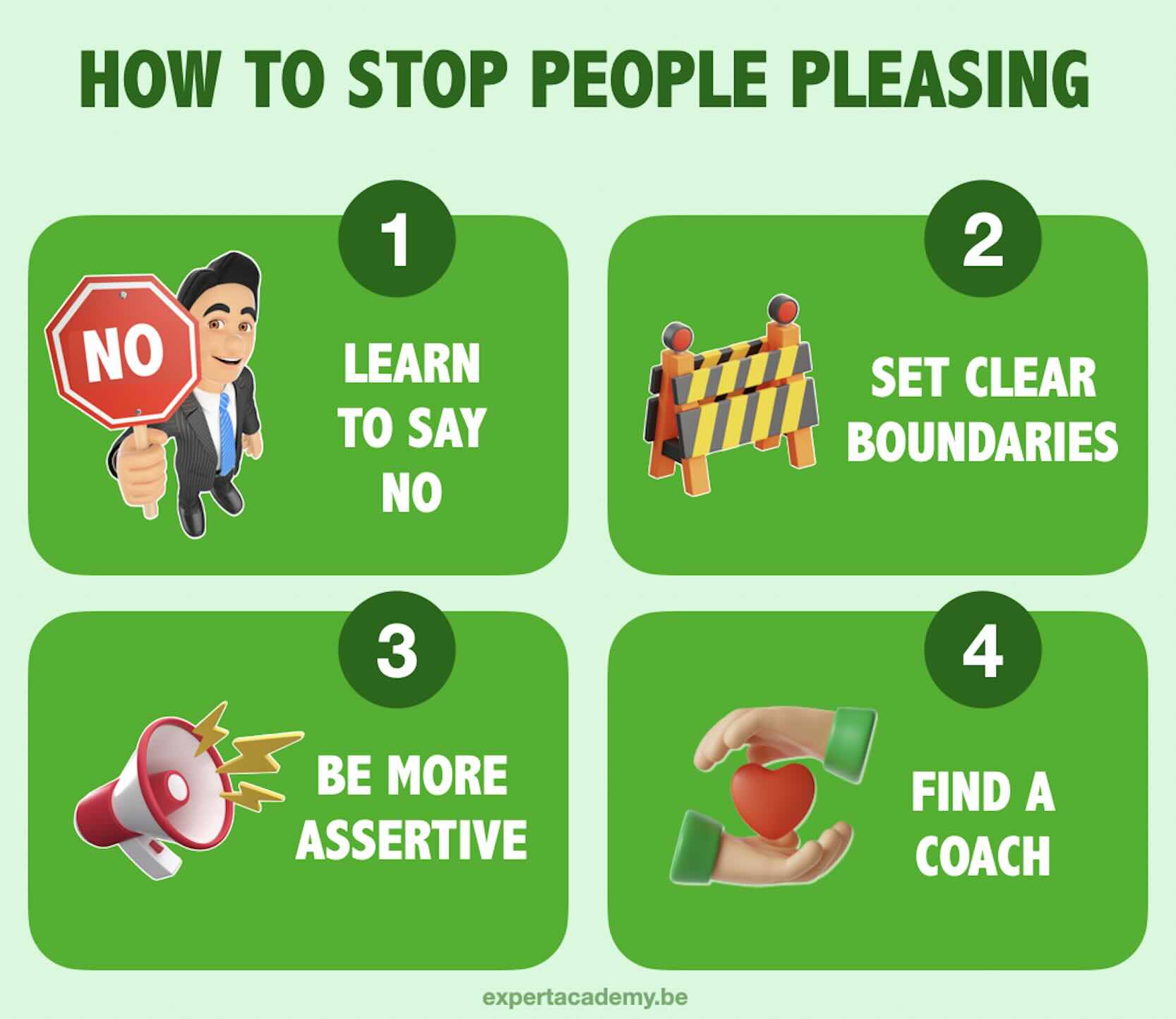Stop people pleasing and start prioritizing yourself

Many people feel the pressure to always keep others happy, even at the expense of their own well-being. This phenomenon, known as ‘people pleasing’, can lead to exhaustion, stress, and a lack of self-care. In this article, you’ll discover how to stop pleasing others and learn to choose yourself, without harming the relationships around you.
Sandy is sitting at her desk. The workday is almost over when her colleague stops by with a request: "Could you help with this report? It needs to be finished by tomorrow." Sandy, already tired from a long day, actually wants to go home. But without thinking, she says, "Sure, of course!" As her colleague walks away with a smile, Sandy wonders why she didn’t just say 'no'. She knows that her evening will now be sacrificed for work she doesn’t really need to do. This isn’t the first time Sanne has found herself in this situation. Each time, she feels the urge to keep others happy, even if it costs her own well-being. Sandy is a ‘people pleaser.’
We all know someone who frequently tries to please others, regardless of the impact on their own well-being and priorities. Maybe you are that person. Let’s take a closer look at what “people pleasing” really means, how to recognize if you're a pleaser, and how you can learn to stand up for yourself.
What is People Pleasing?
'People pleasing' refers to a pattern of behavior where someone constantly tries to keep others happy, even at the expense of themselves. People who do this often find it difficult to say 'no' or to put their own wants and needs first. They fear rejection, confrontation, or disappointing others, which causes them to overstep their own boundaries. While it may seem noble to always be there for others, it can lead to feelings of exhaustion, stress, and frustration.
A study published in the Journal of Personality and Social Psychology shows that people who primarily focus on meeting others' expectations have lower self-esteem and are more prone to stress and burnout. This is because they consistently ignore their own needs, which negatively impacts their well-being in the long term.
Causes of People Pleasing
There are various psychological and social factors that contribute to people pleasing. It often starts at a young age. Children who receive a lot of praise for being 'good' or helping others learn that their self-worth depends on keeping others happy. This behavior can also stem from a need for acceptance or approval from parents, teachers, or friends.
It’s tempting to think that pleasing others causes no harm, but the consequences can be far-reaching:
Loss of identity and personal goals: People who are constantly focused on pleasing others often lose sight of their own desires and goals. They are so focused on others' wishes that they no longer know what they truly want.
Built-up frustration: When you constantly say 'yes' to things you don’t really want to do, you inevitably build up frustration. This frustration can lead to feelings of resentment and can undermine relationships in the long run.
Burnout and stress: Because people pleasers often take on too much, they are at a higher risk of burnout and chronic stress. They keep going, even when their body and mind need rest, out of fear of disappointing others.
Assertiveness: The Key to Self-Care
One solution to people pleasing is being assertive. Assertiveness means standing up for yourself in a respectful way, expressing your own opinions and needs without infringing on the rights of others. People who are assertive have no problem saying 'no' when necessary and feel less guilty about putting their own interests first.
Assertiveness is not the same as being aggressive. While aggression disregards others' respect, assertiveness creates a healthy balance between respecting your own needs and those of others.
According to research published in the European Journal of Work and Organizational Psychology, people who are more assertive are less likely to experience work-related stress and report higher job satisfaction. This is because they are better able to set boundaries and manage their time and energy more effectively.
Many people pleasers struggle with the word 'no'. This often stems from the fear of being rejected or the belief that they will come across as unkind or selfish. But saying 'no' is an essential skill for maintaining healthy boundaries. By saying 'no' to things that don’t suit you, you are actually saying 'yes' to yourself and your own priorities.
It’s important to understand that saying 'no' is not the same as disappointing someone. It’s a way to safeguard your boundaries and protect yourself from overburdening. It takes practice and courage, but it’s well worth the effort to develop this skill.

How to Stop People Pleasing?
Stopping people pleasing begins with self-awareness and a conscious decision to make a change. Here are some tips to help you get started:
Recognize Your Behavior: Try to become aware of specific situations where you notice yourself pleasing others. This will help you recognize patterns. Here’s how you can do this:
Keep a journal: Write down every time you do something that you didn’t really have the time or desire to do. Note how you felt and why you said yes anyway.
Identify triggers: Determine which situations or people trigger your people-pleasing behavior. For example, do you notice that you tend to please certain colleagues or during team meetings?
Set Boundaries: This is not easy, but it’s essential for your own well-being. Start with small steps, like declining minor requests. This doesn’t mean you never help, but that you make deliberate choices.
Practice saying “no”: Start with simple requests. If someone asks you to quickly proofread something, kindly say you’re busy with something else at the moment. You can follow up with a question: Is it urgent? Can it wait? Can someone else help you with it?
Use “I” statements: Be specific and explain why you can’t help, without apologizing. For example: “I need to finish my own project by Friday, so I can’t take on that extra task.”
Get a buddy or a coach: Talk to a trusted colleague or mentor about your tendency to please others. They can help you look at your behavior objectively and support you in making changes.
People pleasing might seem like a way to avoid conflicts and maintain relationships in the short term, but in the long run, it only leads to stress and frustration. It’s not selfish to stand up for yourself; it’s an act of self-care and respect.
More info: Assertiveness Training






